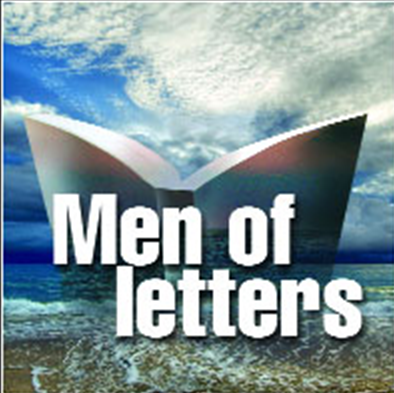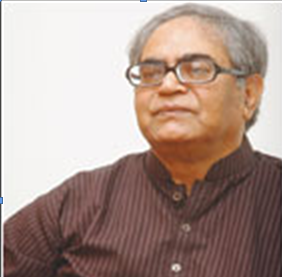Iftikhar Arif
This is a collection of articles archived for the excellence of their content. Readers will be able to edit existing articles and post new articles directly |
Iftikhar Arif
Literature is not a hobby — Iftikhar Arif
Naseer Ahmad
Iftikhar Arif was catapulted into the spotlight in the 1970s when he appeared in PTV’s quiz programme Kasauti. As a bespectacled, sparkling young man, he mesmerised the millions of audience across the nation with the range of his knowledge and intelligence. With Obaidullah Baig and Quraishpur, both profound scholars, as his senior partners at the progamme, he would identify studio audience’s guessed personality, historical incident or structure by asking up to 20 questions. But few among his audience knew him as a poet.
At PTV he was a scripts editor. But the thrill of appearing in a popular programme, when PTV was the only channel available to Pakistani audience, had swept his other attributes out of sight. In an interview with Dawn at Qasr-i-Naz last Sunday, he recalls how he was weaned away from the programme. “One day Saleem Ahmed, the noted poet and writer, asked me weather I wanted to be identified with the people of literature or with the media people. His message was clear that I concentrate more on my poetry rather than doing a quiz programme.”
That phase of the quiz programme was over not long after he walked out of it. But TV viewers missed him when the programme resumed at least twice after long intervals. Asked if he considered it below his official status to join a rerun of the programme when he held an exalted government post in Islamabad, he says: “I had been in London for about 14 years. And while there, I had begun concentrating more on my poetry. Besides, I was no longer abreast with the political, social and cultural development taking place back home. For instance, I did not know well enough the younger lot of cricketers, hockey players and local politicians who had emerged in my absence.” He says he was offered an attractive package by PTV that included fortnightly trips to Karachi from Islamabad for the programme’s recording, “but I declined the offer because I knew I could not do justice to the programme and did not want to spoil the image I had earlier cultivated among TV audience.” Iftikhar Arif may not be an ‘institution’ in his person, as professional speakers are wont to portray some personalities without actually fathoming their merit, but he is the head of a most prestigious state institution, the Pakistan Academy of Letters, tasked to promote Pakistani literature. Statistics show PAL, an autonomous body operating under the ministry of education, has done a remarkable job, particularly since he has been at its helm.
”While in a London library, I was disappointed to see that the pigeonholes containing magazines of countries from across the globe had under ‘P’ magazines from Panama, Peru, the Philippines, but none from Pakistan. So when I joined PAL as its director-general, I arranged to publish a biannual magazine called ‘Pakistani literature’. Earlier there had been a book having the same title, but it contained translations of only Urdu literature. I decided that it should include literature of all Pakistani languages.” He is reluctant to call the vernaculars ‘regional’ languages. “You may not mean so, but it sounds derogatory to call them regional languages.”
He elaborates how he promotes what he calls the Pakistani languages:
”I tried to gradually to narrow down the differences among the languages. Earlier the award given on a book was Rs40,000. And the amount was Rs20,000 for the other languages of the country. I raised it to Rs100,000 and for all languages without discrimination. Besides Urdu, Punjabi, Sindhi, Balochi and Pashto, I initiated awards for Brahvi and Hindko also. I said any language in which up to 25 books were published annually was entitled to getting an award.”
Coming to the production of the magazine, Pakistani literature, he says: “I can assure you that the magazine published by your academy is not lower in standard than any magazine published by an academy in the world. We send copies of this magazine to all universities where South Asian studies are taught as a subject and also to scholars who frequently write on our region.”
He regrets that translation is not given due importance here. “If it were not for their English translations, we wouldn’t have known so many philosophers and writers of the world. Unfortunately, translation here is considered something of secondary importance. We lag behind in English translation. Initially the translations may have deficiencies, but with due appreciation, they will ultimately gain perfection and make our literature popular in the world.”
In the context of translations, he narrates an incident: “Once when Altaf Gauhar, the then information minister, told Faiz sahib that he would like to translate some of his works into English, Faiz sahib remarked: ‘For a translation, one should have command over at least one of the two languages’. But I think it is not enough even to have a command of both languages. The translator should have thorough knowledge of the subject he is handling. For example, some translators of the Quran had very good command over English, but since their understanding of the religion was lacking, it reflected in the translations. On the other hand, translators who had flawed knowledge of the language but had the necessary understanding of the religion fared better.
”If we visit British or American bookshops, we won’t find a translation of Mir Taqi Mir, a powerful poet of the Urdu language,” he says further stressing the importance of English translation of our literature.
When reminded of the remarks he attributes to Faiz Ahmed Faiz that the 18th century belonged to Mir, the 19th to Ghalib and the 20th to Iqbal, and that if he saw any potential in Pakistani poets to become the poet of the 21st century, he says ‘No’. “With the exception of poets such as Garcia, Ezra Pound, Auden...., there have been few big names in the world poetry as well after Eliot.”
He is reluctant to name any poet of great potential among those alive because he does not want to offend them, neither does he want to praise them unduly. But in the post-Iqbal period he names the most prominent names as Faiz, Rashid, Mirajee and Majeed Amjad.
He, however, adds that collectively we have produced great literature during the last 50 to 60 years. It has no precedent in the literary history of South Asia. He says in the field of humour writing, for instance, we had at the same time writers such as Patras Bukhari, Colonel Mohammad Khan, Shafiqur Rehman, Ibn-i-Insha, Zamir Jaffery and Mushtaq Yousufi. He, however, says “no appreciable work has been done in the field of criticism. It is either an outright attack on the writer or poet being discussed or it is his eulogy. No objective criticism is being done.”
Iftikhar Arif says literature is a way of life. “It is not a pastime. The commitment to the sanctity of the word should be life-long. ... A poet is a poet, whatever position he may be occupying. In the west, if somebody says he is a poet, he is not asked what else he is doing. A poet is a poet.”
He says literature transcends all boundaries. In this context, he mentions the name of Maulana Rumi, whose poetry has transcended geographical, religious and linguistic boundaries. “He lived in Iran and is buried in Turkey. Where he has his followers, they don’t know his language. Where his language is understood and spoken, people don’t follow the school of religious thought he did.” He says Rumi’s works are the most recited ones after the holy Quran.
Born on March 21, 1943 in Lucknow, Iftikhar Hussain Arif did his master’s in sociology from the Lucknow University. Earlier he studied at Madressa-i-Nizamia and the Government Jubilee College, Lucknow. He migrated to Pakistan in 1965 and settled down in Karachi. He started his career with the Radio Pakistan as a newsreader. Later, he was selected and appointed the head of scripts department at PTV’s Karachi centre.
So far, he has to his credit four collections of poetry: Mehr-i-Doneem, Harf-i-Baryab, Jahan-i-Maloom and Shehr-i-Ilm kay darwazay par. His poems have been translated into various languages, chiefly in English as Written in the season of fear and Twelfth man. Jawaz-i-Iftikhar is a collection of articles on him and his work by eminent writers such as Faiz Ahmed Faiz, Ahmed Nadeem Qasmi, Mushtaq Yousufi, Mumtaz Mufti, Annemarie Schimmel and Upinder Nath Ashk.

